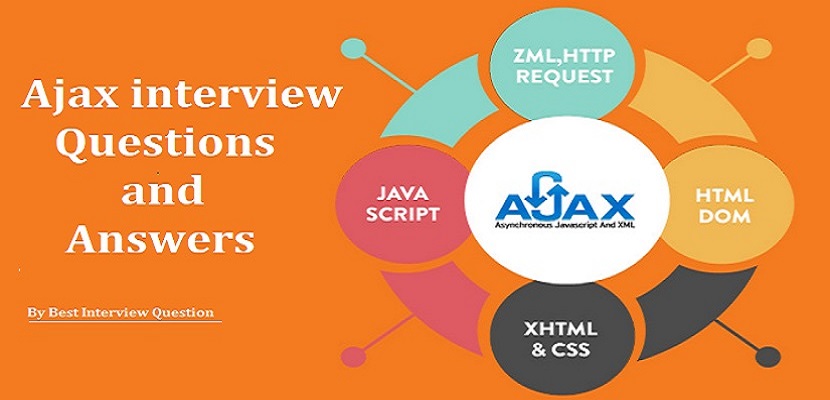Ajax interview questions and Answers

Asynchronous JavaScript and XML is a new age and advanced set of development techniques popular among developers for building websites and web applications faster better and more interactive. It uses XML, CSS, HTML and JavaScript. The core function of AJAX is to update web content asynchronously, which means a user’s web browser doesn’t require to reload an entire web page when only a small portion of page content needs to be changed. It’s neither a tool nor a programming language; AJAX is a concept, a client-side script that communicates to and from a database/server without require of a complete page refresh or a Postback. The demand for AJAX is quite popular among businesses due to its versatility. We will discuss a set of most asked AJAX interview questions relevant to them further here.
Most Frequently Asked Ajax interview questions
| S.no | AJAX | JavaScript |
|---|---|---|
| 1. | AJAX is a technology, not a programming language. | JavaScript is a programming language used to complete client-side tasks in web development. |
| 2. | AJAX is a part of JavaScript programming. | JavaScript is used to control and manage a web page once downloaded. |
Ajax requests produce a wide variety of distinctive occasions that you can subscribe to. Here's a full listing of the activities and in what order they are triggered.
There are 2 types of events in Ajax
- Local Events: Local Events are callbacks that you can subscribe to inside the Ajax request object.
- Global Events: Global events are triggered on the document, calling any handlers who may be listening.
Example of Local Events
$.ajax({
beforeSend: function(){
},
complete: function(){
}
});
Example of Global Events
$.ajax({
url: "bestinterviewquestion.html",
global: false,
});
To improve AJAX call performance, follow these steps:-
- Reduce the AJAX request numbers.
- Wisely elect the event on which AJAX request triggers.
- Appropriately use GET requests.
- Reduce the amount of data transmitted.
- Secure data using Caching.
| S.no | synchronous | asynchronous |
|---|---|---|
| 1. | Synchronous or ( async: false ) script stops the program and waits for the server to send back a reply before continuing. | Asynchronous or ( async: exact) script allows the web page to continue to be processed and will handle the reply when and if it arrives. |
There are five types of active states available in AJAX. Here are those:
- request not initialized - ready state 0
- server connection established - ready state 1
- request received - ready state 2
- processing request - ready state 3
- request finished, and the response is ready - ready state 4
AJAX allows web pages to be modified asynchronously. It combines several programming tools primarily JavaScript, Extensible Markup Language – XML, dynamic HTML, CSS, DOM and XMLHttpRequest. This suggests the name AJAX here.
Script Manager, as the identify suggests is used to managing the client-side script of Ajax. Since Ajax makes use of JavaScript, there desires to be a mediator to control this script and hinder a precise model to a browser. A Script supervisor is existing on each and every web page the place Ajax is used to allow the Ajax Libraries. These Libraries, in turn, helps to put into effect the Core Functionality of Ajax: Partial rendering.
AJAX is a technique used to create dynamic and fast web pages and applications. It allows web pages to be updated asynchronously by interchanging small amounts of data with the backend server. It communicates with the server with the XMLHttpRequest object.
AJAX has plenty of features and advantages for its users. Few of the best ones are described below:-
- It allows asynchronous calls to a web server.
- Minimal data transfer and network utilization quicker operation.
- Limited processing on the server
- AJAX applications are very responsive due to the asynchronous on the client
| S.no | AJAX | JSON |
|---|---|---|
| 1. | AJAX is a group of technologies. | JavaScript Object Notation or JSON is a text-based open standard designed for human-readable data interchange. |
| 2. | It refers to receiving and sending data between a web browser’s objects and another source. | JSON is a data and can be sent via AJAX but can be used for other purposes besides AJAX. |
Advantages
- Excellently reduces the server traffic for both side requests which results in enhanced side response speed.
- Improved user experience and better user productivity.
- Decreased bandwidth usage and increased performance speed.
- Better language compatibility and supports asynchronous processing
- Fewer server hits and network load
- Easier navigation and form validation.
Now let’s discuss a list of compiled AJAX interview questions and best possible answers for them for your acknowledgment. These interview questions are best suitable for both fresher and experienced candidates.